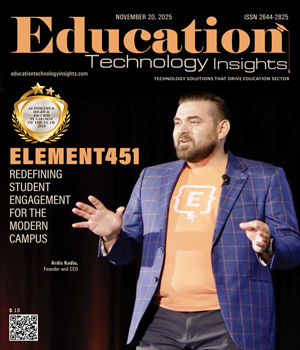THANK YOU FOR SUBSCRIBING
Be first to read the latest tech news, Industry Leader's Insights, and CIO interviews of medium and large enterprises exclusively from Education Technology Insights
Would the new generation of technology change our education?
Hamed Sarbazhosseini, Assistant Professor in Information Systems at the University of Canberra
Through this article, Hamed Sarbazhosseini emphasizes that artificial intelligence (AI) is significantly impacting education, just as previous technological advancements have. The author emphasizes that while AI is changing the way students learn and engage with education, there is a need for a balanced approach where AI is used as a tool rather than a crutch.
As has been a while since critical changes have been made to our day-to-day life with the use of AI. The AI has impacted everyone differently and it is not the first time that we have dealt with a change. In the recent COVID pandemic, everyone was forced to educate themselves with online platforms for meeting, collaborating, sharing documents, and education. AI is not new to this phenomenon where changing the way we live our lives. But there are some differences with the new generation of this technology. There are perhaps many theoretical studies and research recently published or under review for understanding the impacts, challenges, or benefits, but the real question is where the most we will see the future with AI.
“While the use of AI should be encouraged, mechanized, investigated, and researched, there should be a system to support and educate our new generation. This must start from individual families who can start using the AI at home on different activities.”
In my current academic role, the first point is not just that students should or not use AI or possible issues with plagiarising but how would this change the literacy and quality of our students, academics, educators, policymakers and everyone who is contributing to the education. Yes, there is a fear that students will be soon more reliant on AI than willing to educate themselves with all the living costs rising. While this should be investigated in-depth from culture, behavior, psychological and skills and other aspects the truth is the change has already happened to the current generation. As an academic who teaches both undergraduate and postgraduate students, it is evident that the new generation of undergraduate students is most likely to use AI due to the nature of their era, even though this is not the only factor, it is a contributing reason. On the other side, most postgraduate students are likely to rely on their own knowledge and analysis skills. We can see these students are more engaged with their lectures, tutorials, labs, and overall support that has been provided to them. Why? Maybe because these students are more independent, and the current postgraduate students are seeking value for money in their education. However, the next generation of postgraduate students might be different as we continue.
While the use of AI should be encouraged, mechanized, investigated, and researched, there should be a system to support and educate our new generation. This must start with individual families who can start using AI at home for different activities. For example, what should we do this weekend or what future job should I consider, asking from AI. While the response from the AI should not be the only justification or reference, as a father of two kids, this should be explained and justified in the first place within the families with appropriate justification to prove that the human involvement in making the decision, and evaluation of the quality of the answer is the critical factor. This means, still the education system should support and do their part.
I would like to conclude that the education system has already been changed. The benefits should be discussed by highlighting what can complete the AI’s response with a focus on people, skills, and experience. So, let’s start with families to educate ourselves and prepare students for a better future and better quality of life using more critical technologies.
Read Also
Navigating Course Map Design
Beyond the Classroom: Supporting Belonging and Wellbeing for International Students
Building Responsible AI Practice Across a University
Designing Engagement That Lasts
Digital Creativity as a Catalyst for Deeper Learning
Protecting Precious Cargo: A Comprehensive Look at School Bus Safety

I agree We use cookies on this website to enhance your user experience. By clicking any link on this page you are giving your consent for us to set cookies. More info



















